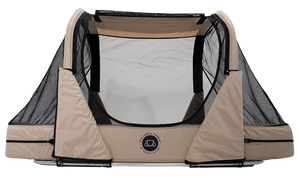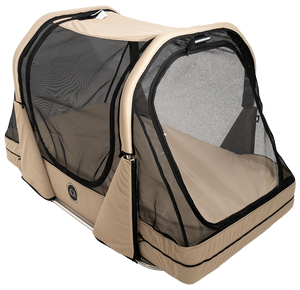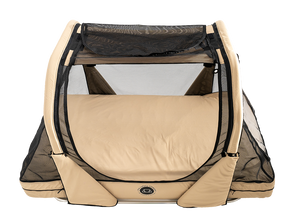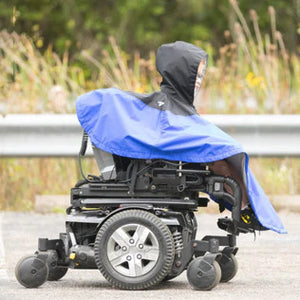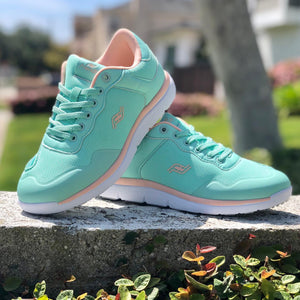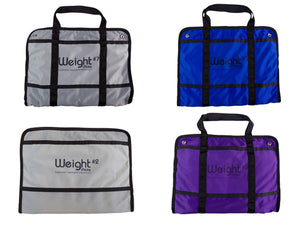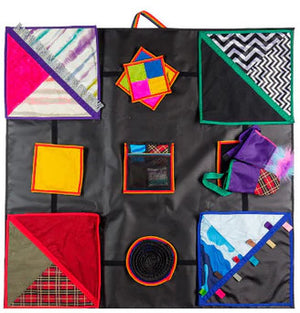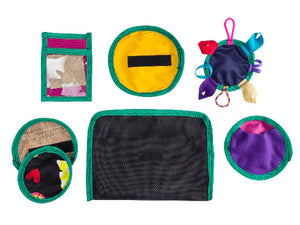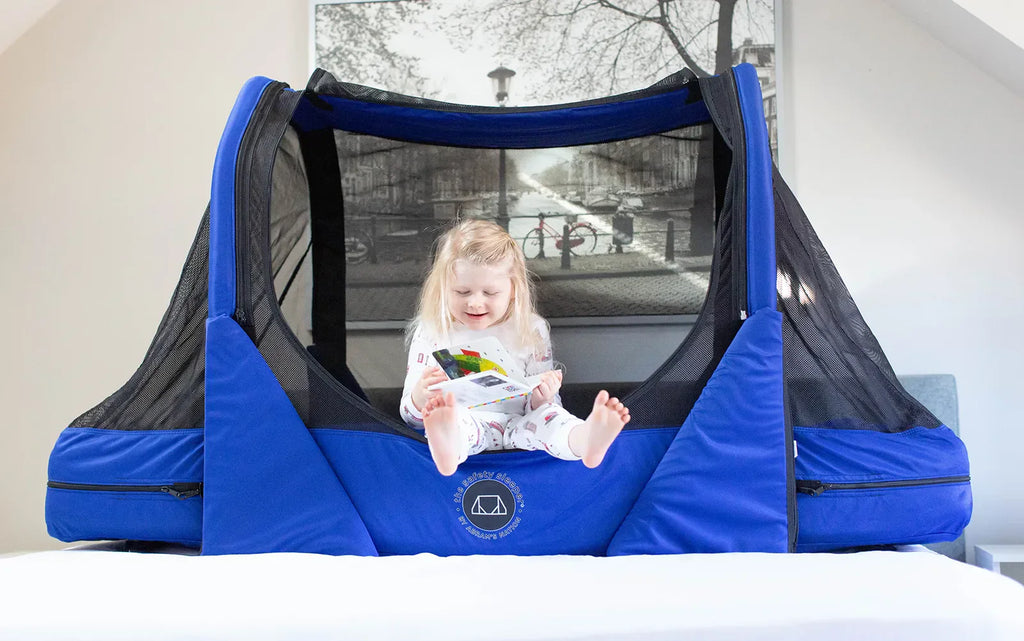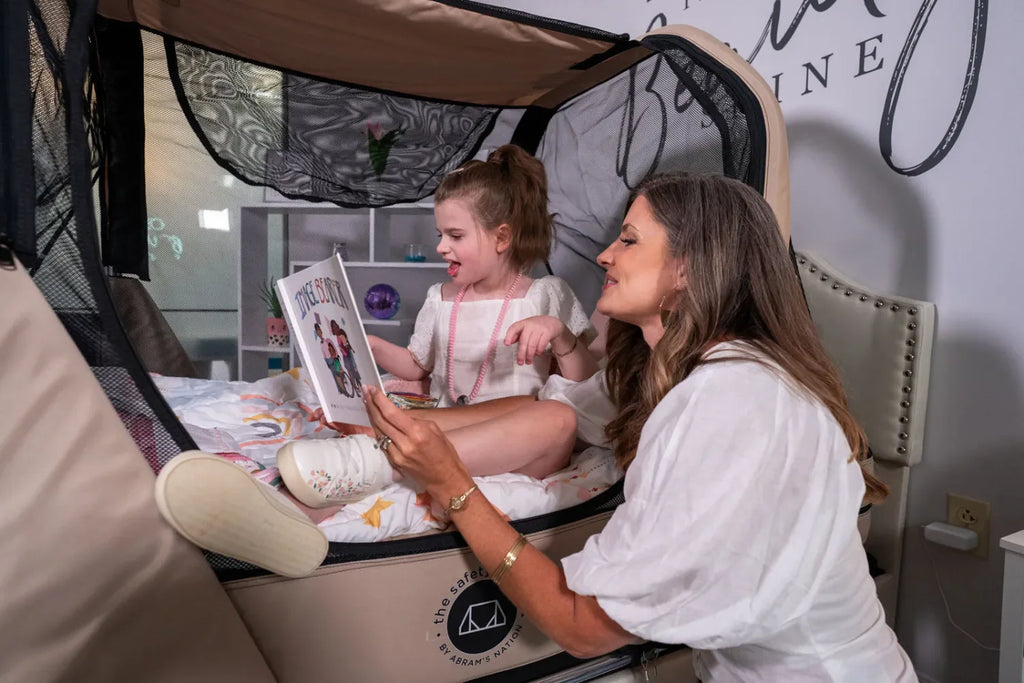Falling and staying asleep at night can be difficult for anyone, but it can become especially challenging for adults with special needs. That’s why special needs beds for adults, like The Safety Sleeper®, are so important.
By offering a safe, secure, and soothing sleep environment, a special needs bed can improve the quality of life for your loved one by:
- Support nighttime safety by helping prevent wandering
- Reduce the risk of accidental falls
- Provide a barrier for individuals who may engage in pica behaviors
- Minimize sensory distractions that can interfere with settling down
More importantly, a special needs bed is designed to provide the unique blend of comfort and durability your loved one requires, and they’re available with a variety of special features.
Why Choose Safety Beds For Adults With Autism?
For many adults with autism, achieving restful sleep can be a considerable challenge due to a range of factors.
Individuals with autism often cope with sensory hyperreactivity, such as a heightened sensitivity to sounds, lights, textures, and other stimuli. They may find certain noises too loud or overwhelming and may react negatively to bright or flickering lights, strong scents, or uncomfortable clothing textures.
This sensory overload can lead to increased stress levels, creating a cycle where stress exacerbates sensory sensitivity, necessitating restorative and controlled environments .
To counter these challenges, many caregivers of adults with autism seek out safety or enclosed beds, such as The Safety Sleeper®, that provide a secure, soothing environment. While there’s no such thing as an “autism bed,” safety beds for special needs and enclosed beds are designed for use by special needs individuals, including adults with autism. These beds are not medical treatments, but they can be a meaningful part of a comprehensive support strategy, especially when peace of mind is a top priority.
Considerations When Picking A Bed for An Adult With Special Needs
When browsing special needs beds for adults, consider these factors to ensure you pick the perfect safety bed:
1. Do you need an enclosed safety bed?
Special needs safety beds often come equipped with sidewalls designed to offer a secure boundary for your loved one while they sleep. In addition to sidewalls, some beds also feature a breathable roof, which creates a barrier that provides a comforting enclosed space for your loved one.
For individuals who may be prone to wandering, an enclosed design can offer an added layer of nighttime safety. These enclosed spaces are thoughtfully engineered to reduce the risk of injury while promoting peace of mind for both the user and the caregiver.
2. How much does a safety bed cost?
In general, a quality safety bed will cost between $5,000-$15,000. However, many families are able to get their safety bed covered by insurance with the right documentation and process. Alternatively, they may rely on other options, such as fundraising, if their bed isn’t covered through insurance.
Regardless of insurance coverage, it’s important to choose a high-quality safety bed that fits your budget, but affordability doesn’t have to mean compromise.
For example, The Safety Sleeper® 200 model twin is priced at $4,010.50, offering a cost-effective and travel-friendly solution. Alternatively, comparable safety bed options start at $10,000. With The Safety Sleeper®, families can access the quality and durability they need at a more accessible price point.
Learn more by visiting our funding guide.
3. How many access points are available for medical intervention?
Consider the number of access points available for medical interventions. If your loved one uses medical equipment such as a feeding tube, IV drip, or other necessary tubing or wires, having designated access points in the bed's structure is essential.
These thoughtfully placed openings can help prevent tangling and make it easier to manage and administer medical care, ensuring the process is as smooth and stress-free as possible for both you and your loved one.
Most models of The Safety Sleeper® are thoughtfully designed with designated access points to support a variety of care needs. For families choosing The Safety Sleeper® Model 200, this feature is available as part of our flexible customization options, so you can create the solution that best fits your loved one’s unique needs.
4. What size safety mattress will you need?
Most adults are able to fit comfortably on twin XL, full, or queen-sized bed. However, when you’re creating a calming bedroom environment for your loved one, it's important to choose a size that fits their body, routines, and preferences.
A very petite adult may be happy in a twin XL bed, while heavier or larger adults may prefer a larger bed size, such as a queen. Additionally, for adults with autism who enjoy spending leisure time in bed, such as watching TV, a larger bed size can offer more comfort and space to engage in these activities.
Whether your loved one prefers to stretch out or simply needs extra space to feel relaxed, selecting the right size helps support both comfort and peace of mind.
5. How sturdy is the safety bed?
When choosing a bed for an adult, it’s important to consider more than just weight. Strength, movement patterns, and certain behavioral needs, such as pica or self-injury, may require a more robust design.
If your loved one has strong physical impulses or tends to shake or push against structures, a durable, well-secured bed can offer greater peace of mind.
The Safety Sleeper® is designed with reinforced panels and stabilizing options to help withstand heavy use, supporting safety without sacrificing comfort.
6. Is the bed mobile?
Mobility in a safety bed is important for two distinct reasons:
First, you may want to consider the ease of moving the bed within your home or living facility. A bed with wheels or a design that allows for simple relocation can be incredibly helpful when you need to transport the bed.
Secondly, consider the bed’s travel friendliness. If your lifestyle includes frequent travel with your loved one with special needs, includes visits to family, overnight stays at hotels, or out-of-town hospital trips, a travel-friendly safety bed can make all the difference. Look for one that’s lightweight, easy to pack, and simple to set up, helping you preserve sleep routines and comfort no matter where you are.
7. Are the bed and its accessories easily washable?
Safety beds naturally require frequent cleaning, from everyday use to managing unexpected messes or medical needs. While some beds are marketed as washable, they may require disassembly or even a technician's help, which can make regular cleaning feel like a major task.
The Safety Sleeper® was designed with ease in mind. The mattress is easily removable, and both the enclosure and coverlet can be machine washed at home. No special tools. No extra help. Just a simple, thoughtful design that fits your real-world routines.
When evaluating a safety bed, make sure it’s made with durable, washable materials that support quick, thorough cleaning.
8. Is the safety bed height adjustable?
Choosing the right bed height is essential for your loved one's comfort and your ability to provide care effectively. If your loved one uses a wheelchair or lift, the height of the bed can affect how easily they can get in and out. For instance, beds that are low to the ground or positioned on the floor can be ideal for those with mobility challenges or unsteady gait, allowing for safer transitions.
On the other hand, the bed's height also influences how you, as a caregiver, can support your loved one. Beds that are too low can require frequent bending or kneeling, which can take a toll on your body over time. Many family caregivers and professionals alike experience higher rates of lower back pain from repetitive lifting or awkward positioning.
The Safety Sleeper® is available in a lift-compatible model that works with many transfer devices, offering added flexibility and reducing physical stress on caregivers. It’s a thoughtful solution designed for both sides of the caregiving experience.
9. What is the mattress made from?
Neurodivergent individuals may also experience comorbid medical conditions, including:
-
Muscle rigidity (hypertonia)
-
Low muscle tone (hypotonia)
-
Chronic pain.
That’s why choosing a safety bed with the right type of mattress is essential. Many models include memory foam mattresses designed to provide balanced support and gentle cushioning. Others offer travel-friendly companion air mattresses that provide a similar comfort experience in a portable format.
For example, each The Safety Sleeper® model comes with a companion air mattress to ensure that your loved one can rest well, no matter where they are.
10. Are there any entrapment points that could harm your loved one?
When evaluating a safety bed, it's essential to consider whether the design includes any potential entrapment points, areas where a person might accidentally become wedged or restricted. This is especially critical for individuals with autism, who may have seizures, strong physical movements, or specific sleep behaviors.
One mother shared her experience before finding The Safety Sleeper®:
“One morning, I discovered my precious 3-year-old wedged between the wall of the tent and his mattress. He was having a seizure and became entrapped, with his face pressed against the mattress. Mercifully, he was okay, but the terror of that situation pressed me to find a safer sleeping environment.”
The Safety Sleeper® was developed with concerns like these in mind. Its enclosed design and custom waterproof coverlet sheet are thoughtfully constructed to eliminate common gaps around the mattress and frame, reducing access points and supporting a safer sleep environment.
11. How many points of entry are available for entering and exiting the bed?
When choosing a safety bed, consider how many access points are available for getting in and out. Some beds are designed with access from only one side, which may be sufficient in many cases, but if multiple caregivers are involved, this can be limiting.
A bed with entry points on two or more sides can make it easier to assist your loved one with dressing, transfers, or medical care, all while minimizing disruption to their comfort. It also allows for greater flexibility when rearranging a room or adjusting to different caregiving routines.
The Safety Sleeper® offers models with multiple access panels, supporting both comfort and convenience for families and care teams alike.
Find a Special Needs Bed Perfect For Your Loved One
We offer a variety of fully enclosed beds, like the 200 Model of The Safety Sleeper®, specifically designed for adults. Each bed is hand-assembled with care and built to your exact specifications, helping create a secure and calming sleep space for your loved one.
If you have questions about product designs, customization options, or funding support, we’re here to help. We offer multiple payment plans and can assist with coordinating insurance coverage or connecting you with financial resources.
Let us help you find the solution that best fits your family’s needs, because peace of mind should never be out of reach. Get in touch.

